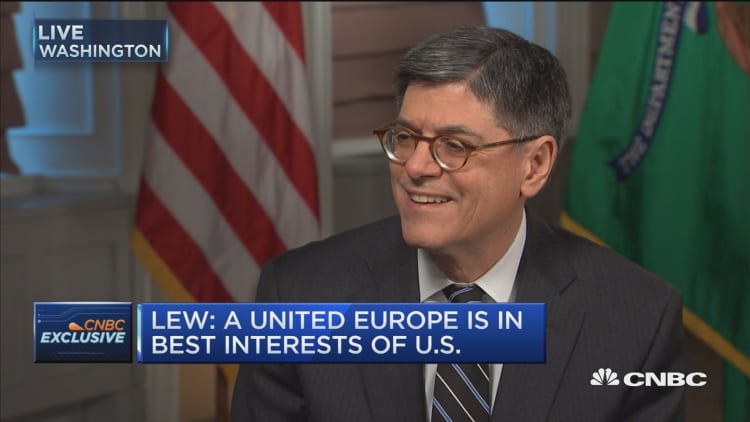
Outgoing Treasury Secretary Jack Lew defended the Obama administration's economic record on Tuesday, insisting that the past eight years have seen real gains for American workers.
"There is no question but there is a lot of anxiety both in the United States and around the world, and I think it is coming from multiple sources," Lew said in a live CNBC interview, just days before he prepares to leave office. "The rate of technological change is the fastest in history. Globalization on top of that has created challenges through competition.
"But the answer has to be, how do we grow more and how do we make sure that we are distributing the benefits of growth better? We have done a lot in the last eight years on both scores."
With his days in office winding down, Lew addressed a broad range of topics.
However, he mostly backed off when asked to comment on several statements or positions espoused by incoming President Donald Trump.
Asked about Trump's comments that a rising U.S. dollar is hurting the economy, Lew said, "As you know I avoid commenting on statements like that." Instead, he said the U.S. simply should focus on strong economic growth.
"I think a strong U.S.economy is in our national interest. We've done anything we can to promote a strong U.S. economy," he said. "I don't think I need to remind you where the economy was just eight years ago."
However, real economic growth has been lackluster through the Obama years. Gross domestic product gains have averaged only around 1.6 percent, the worst recovery since the Great Depression and one that will put Obama as the only two-term president never to have seen more than 3 percent growth for a single calendar year.
Moreover, wage growth has been weak and has resulted in worker paychecks rising little in inflation-adjusted terms over the past eight years. The uneven nature of the recovery prompted a populist revolt that has seen big Republican gains at the state and federal government levels, culminating in Trump's shocking victory in the November election.
Lew avoided the political questions but defended the overall nature of the recovery.
"I think the perception is actually much worse than the reality, but I can understand why," he said. "We've had proposals that would have done quite a lot even beyond what we've done, but we have not gotten political consensus behind them."
Outside the U.S., Lew also was noncommittal about the blueprint for the U.K.'s exit from the European Union, though he said he hoped for unity. U.K. Prime Minister Theresa May on Tuesday issued a 12-point Brexit plan in a closely watched speech.
"The U.K. is an important partner of the United States, an important partner of Europe either from within our outside of the EU, and I'm going to withhold judgment until the end," Lew said.
He also said the U.S. should maintain good relations with China, which he called "the most important bilateral relationship economically we have in the world."
At the World Economic Forum in Davos, Switzerland, on Tuesday, Chinese President Xi Jinping
acknowledged that economic globalization has created problems, but said "this is no justification to write off economic globalization." He warned that populist approaches could lead to war and poverty.


